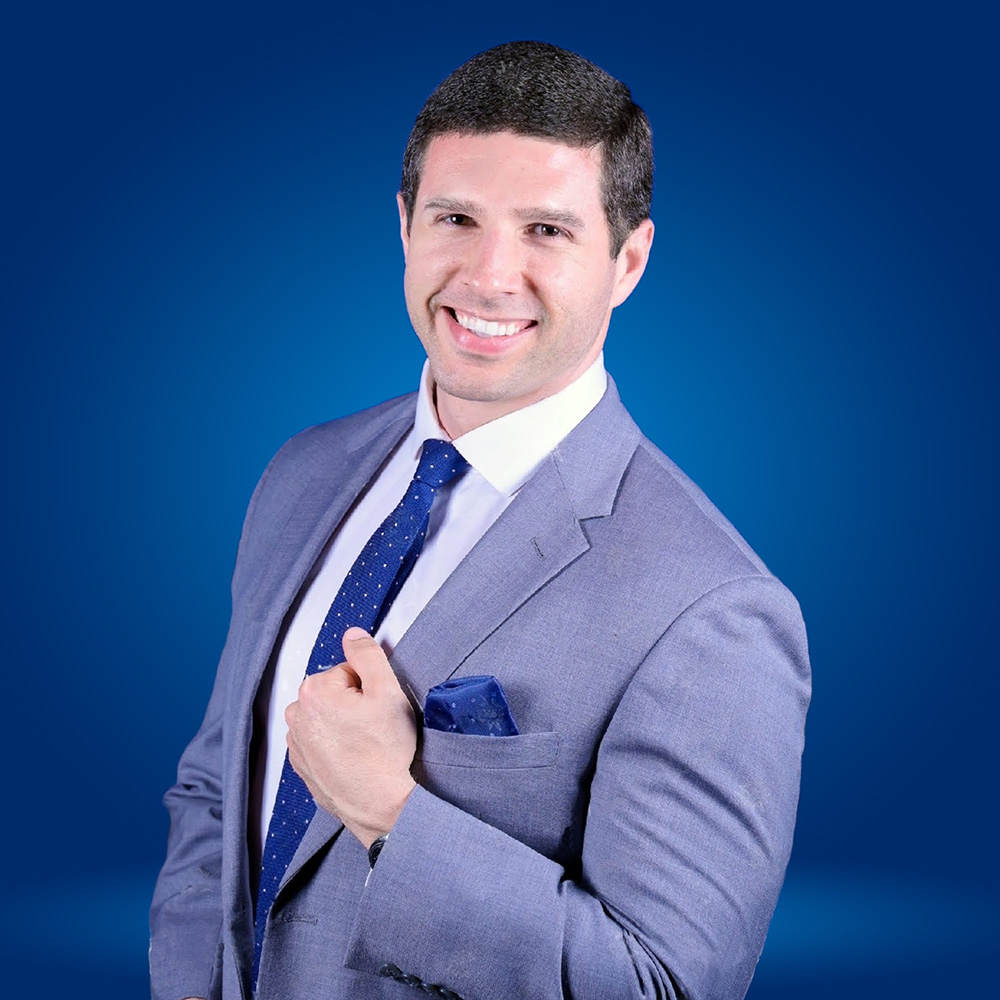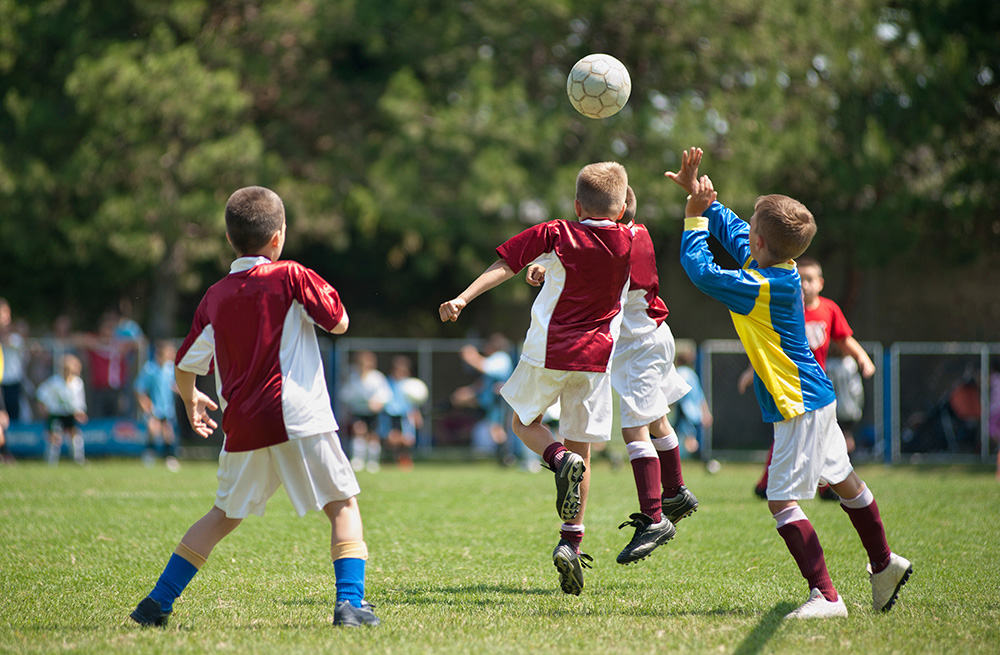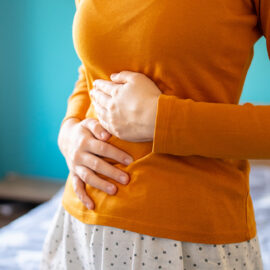
Without regular access to nutritious food, children experience a world out of focus that limits their ability to learn and thrive. In a school setting, these students experience poorer memory, receive lower test scores, and can lack the ability to learn essential social skills at a critical stage in their development that sets the tone for their future.
In the United States, over 30 million kids rely on school meals for up to 1/2 of their daily calories.
You can help us unlock kids’ full potential by using the Food for Focus filter, available on Instagram and Facebook, to create an unfocused selfie and post it before September 30. Orgain will then donate $5 per post to FoodCorps to help bring nutritious meals to schools. The blurred image represents the lack of focus and concentration that millions of children experience daily due to food insecurity and the lack of nourishment necessary for cognitive health.
Visit Orgain.com/FoodForFocus to access the Instagram filter and support this important cause.

It’s widely understood that proper nutrition is essential for brain development. For children, the positive impact of a healthful and varied diet stems far beyond this – it contributes to improved focus, concentration, and ultimately supports learning potential and academic achievement. In the United States, 1 in 8 children are at risk for hunger, putting them at a severe disadvantage in a school setting.1 Evidence suggests children that do not receive sufficient nutrition are at high risk for exhibiting impaired cognitive skills, including low attention spans, and are more likely to have behavioral deficits.2 In order to help children get the nutrients they need to thrive academically, it’s important to understand the connection between brain health and learning, in addition to addressing the interconnected and complex issues that impact learning outcomes, such as accessibility and food insecurity.
The Impact of Diet on Brain Function in Children
The brain is the most complex part of the human and controls a myriad of body functions and senses including memory, thought, emotion, motor skills and hunger. Throughout one’s lifetime, food and nutrition are essential in the maintenance of brain performance, and aid in the treatment of mental disorders. Good nutrition during pregnancy and early childhood, specifically between a woman’s pregnancy and roughly to a child’s second birthday, are critical for a child’s brain development. During this period of rapid brain growth, nutrients are necessary for the creation of neurons, which are the cells that send and receive signals from the brain; the formation of myelin, the fatty matter that covers axons which accelerate the speed of nerve impulses traveling between cells; and synapses which support learning ability. During this time, referred to as the “first 1,000 days of life”, the brain grows more quickly than at any other time in a human’s life and requires key nutrients to feed the brain’s rapid development.3 There are eight vital key nutrients that play a specific role throughout this time. This includes carotenoids (lutein + zeaxanthin), choline, folate, iodine, iron, omega-3 fatty acids, and vitamin D. Other nutrients for maternal, newborn, and toddler health include protein, magnesium, vitamin A, vitamins B, and other trace minerals.3,4
While these first few years of life are a critical period for brain growth and development, it’s important to keep in mind that a child’s brain continues to develop through adolescence. For this reason, adequate nutrition, and overall diet quality, remain important in supporting various brain functions that directly affect learning outcomes. Inadequate intake of calories, protein, fatty acids, and micronutrients disrupt these neurodevelopmental processes.5 Additionally, diets with low consumptions of nutrient-rich foods like fruits and vegetables, and high intakes of highly processed and sugar-laden foods, has been linked to poor cognition and academic achievement.
According to the 2020-2025 Dietary Guidelines for Americans, developed collaboratively by the U.S. Department of Agriculture (USDA) and U.S. Department of Health and Human Services (HHS), nutritional recommendations for calories, macro- and micronutrients are categorized by age groups, starting at age two, and gender (starting from age four and up). The 2020-2025 Dietary Guidelines for Americans is a standard reference for macro- and micro-nutrient needs for children.6 However, since there is no single nutrient that could improve a child’s brain health, maintaining a diet varied in foods is important to ensure a variety of nutrients are consumed. Adequate intake of all nutrients including protein, fats, carbohydrates, vitamins, minerals, and water is essential for brain structure and formation. However, micronutrients, such as iron, zinc, choline, iodine, folate, B12, and long-chain polyunsaturated fatty acids (LC-PUFAs) have been identified to be particularly relevant to cognitive development.7
Nutrition & Attention Deficit Hyperactivity Disorder (ADHD)
ADHD is one of the most common neurological disorders in children and is a condition that makes it difficult to concentrate, pay attention, sit in one place, follow directions, and control impulsive behaviors. There is no specific diet to manage symptoms of ADHD and reported associations between ADHD and a single nutrient are inconsistent. However, there is growing evidence linking essential dietary nutrients to ADHD.
One systemic review and meta-analysis of six dietary patterns and six foods or macronutrient studies in children, published in the journal Clinical Nutrition ESPEN. The data revealed that a “healthy” dietary pattern consisting of vegetables, fruits, legumes, and fish was protectively related with ADHD, whereas a “Western” dietary pattern, containing high amounts of sweets, red meat, refined grains, processed meats, soft drinks, and hydrogenated fats, was related to an increased risk of ADHD and an exacerbation of symptoms in children diagnosed with ADHD.8 Note that while sugar may lead to an increase in energy levels, studies have revealed there is no association between sugar consumption and incidence or cause of ADHD.9
Short-acting medicines for ADHD can aid in focus and self-regulation, but often may act as an appetite suppressant decreasing their intrinsic desire to eat and potentially putting them at risk for impaired growth. Children that take the medication at breakfast tend to lose their appetite by lunchtime. Once the medication wears off and appetite picks back up, children are more likely to binge on foods or eat later than usual.10 Poor appetite and inadequate nutrition can further impact a child with ADHD – from their ability to learn in the classroom to their behavior and overall sense of well-being. It’s important for a pediatric team of healthcare professionals to develop strategies with families, such as an eating schedule, to ensure children are adequately meeting calorie and nutrient needs.
How Healthcare Professionals Can Make a Difference
Healthcare professionals, especially those in a pediatric setting, can advocate for greater food security and improved health for children and their families. This includes screening patients and their families for food insecurity, recommending appropriate interventions, and when appropriate referring families to federal nutrition programs, such as the Supplemental Nutrition Assistance Program (SNAP) and Special Supplemental Nutrition Program for Women (WIC). Furthermore, educating families on their child(ren)’s nutritional needs is important. Providing this information along with simple and budget-friendly ways to include nutrient-dense foods in a child’s daily diet regimen are great ways to ensure children are fueled for learning.
Here are some simple food and snack ideas to help fuel young minds, shared by registered dietitian, mom, and Orgain Nutrition Advisory Board member, Alison Tierney, MS, RD, CD, CSO:
- “Rushed mornings often lead to less-than-ideal breakfast choices, like eating on the commute or skipping it altogether. To improve focus and concentration in school, providing a nourishing meal at the table is crucial. As a mom of two busy kids, my favorite solution is to take the morning prep work out of it. Choose easy to freeze meals ahead of time for quick re-heating! Waffles, muffins, and breakfast cookies that could be stored in the freezer and defrosted are great options!
- It can be tough to include dark, leafy greens into a child’s diet. Greens such as spinach, kale, and lettuce contain brain protecting nutrients, especially folate. Adding greens to a smoothie is a simple way to include those important nutrients. Instead of hiding the greens, have your child help you make the smoothie by putting a handful of spinach into the mix.
- Berries are linked to better brain health and can enhance children’s cognitive function. Encourage your kids to join meal prep by letting them wash berries and de-stem strawberries using safe nylon knives and a kitchen standing tower. You might even catch them enjoying the berries as they work!”
The Orgain Kids portfolio of nutrition products includes a variety of delicious ready-to-drink shakes and powders to support growing children. Here are some of Orgain’s best-selling products and nutritional highlights for consideration with pediatric patients:
Orgain Kids Protein Nutrition Shake Mix– NEW
- Available in Vanilla Bean and Chocolate Brownie
- Organic Fruit & Vegetable Blend
- Gluten Free and Soy Free
- No Artificial Colors or Flavors
- 35% less sugar than the leading Kids Shake Mix
- Nutritional highlights per 2-scoop serving:
- 180 calories
- 8g Grass-Fed Dairy Protein
- 4g Dietary Fiber
- 22-23 Vitamins and Minerals*
*Varies based on flavor
Orgain Kids Protein Organic Nutritional Shake
- Available in Vanilla, Chocolate & Strawberry
- Organic Fruit & Vegetable Blend
- Non-GMO, Gluten Free, and Soy Free
- No Artificial Colors or Flavors
- Nutritional highlights per 8-oz. container:
- 180 calories
- 8g Grass-Fed Dairy Protein
- 22 Vitamins & Minerals
- 3g Dietary Fiber
Orgain Kids Plant Protein Organic Nutritional Shake
- Available in Vanilla & Chocolate
- Non-GMO, Gluten Free, and Soy Free
- Organic Fruit & Vegetable Blend
- No Artificial Colors or Flavors
- Nutritional highlights per 8-oz. container:
- 200 calories
- 8g Plant Protein
- 23 Vitamins & Minerals
- 3g Dietary Fiber
Learn More with Orgain
To further support your knowledge of the relationship between nutrition and brain health, plus nutritional strategies that could lead to improved academic performance in children, check out these other Orgain-sponsored educational resources:
The Good Clean Nutrition Podcast
Episode 2: The Power of Family Mealtime: Barriers, Benefits and Strategies for Eating Together with Jill Castle, MS, RDN
Episode 11: Brain Food – Exploring the Gut-Brain Axis with Uma Naidoo, MD
Science-Based Briefs
Feeding the Gut-Brain Connection
Rethink Family Meals: Tips & Strategies with Jill Castle, MS, RDN
Allergy Friendly Meal Planning with Colleen Webb, MS, RDN
Professional Education Webinar Series
Offers 1 CPEU for RDNs and NDTRs!
References:
- Hunger deprives our kids of more than just food. Feeding America. https://www.feedingamerica.org/hunger-in-america/child-hunger-facts
- Roberts, M., Tolar-Peterson, T., & Reynolds, A., et al. (2022). The effects of nutritional interventions on the cognitive development of preschool-age children: A systematic review. Nutrients, 14(3), 532. https://doi.org/10.3390/nu14030532
- Nutrition in the first 1,000 Days. https://www.thousanddays.org/wp-content/uploads/1000Days-Nutrition_Brief_Brain-Think_Babies_FINAL.pdf
- Likhar, A., & Patil, M. S. (2022). Importance of maternal nutrition in the first 1,000 Days of life and its effects on Child development: A narrative review. Cureus. https://doi.org/10.7759/cureus.30083
- Naveed, S., Lakka, T., & Haapala, E. A. (2020). An overview on the associations between health behaviors and Brain Health in children and adolescents with special reference to Diet Quality. International Journal of Environmental Research and Public Health, 17(3), 953. https://doi.org/10.3390/ijerph17030953
- Dietary guidelines for Americans. Dietary Guidelines for Americans. https://www.dietaryguidelines.gov/sites/default/files/2020-12/Dietary_Guidelines_for_Americans_2020-2025.pdf
- Roberts, M., Tolar-Peterson, T., Reynolds, A., Wall, C., Reeder, N., & Rico Mendez, G. (2022). The effects of nutritional interventions on the cognitive development of preschool-age children: A systematic review. Nutrients, 14(3), 532. https://doi.org/10.3390/nu14030532
- Shareghfarid, E., Sangsefidi, Z. S., Salehi-Abargouei, A., et al. (2020). Empirically derived dietary patterns and food groups intake in relation with attention deficit/hyperactivity disorder (ADHD): A systematic review and meta-analysis. Clinical Nutrition ESPEN, 36, 28–35. https://doi.org/10.1016/j.clnesp.2019.10.013
- Del-Ponte, B., Anselmi, L., & Assunção, M. C. (2019). Sugar consumption and attention-deficit/hyperactivity disorder (ADHD): A birth cohort study. Journal of Affective Disorders, 243, 290–296. https://doi.org/10.1016/j.jad.2018.09.051
- Side effects of ADHD medication. Child Mind Institute. (2023, April 14). https://childmind.org/article/side-effects-of-adhd-medication/
In response to the rising demand for Orgain Kids products, we’re thrilled to share one new product and a new flavor of the popular kids shake!
Orgain Kids Protein Nutrition Shake Mix– NEW

Made with grass-fed dairy, Orgain Kids Protein Nutrition Shake Mix is the latest addition to the Orgain Kids portfolio and is available in two fun and delicious flavors, Vanilla Bean Ice Cream& Chocolate Brownie. Here are some of the nutritional highlights per 2-scoop serving:
- 180 calories
- 8g Grass-Fed Protein
- 4g Dietary Fiber
- 22-23 Vitamins and Minerals*
- Organic Fruit & Vegetable Blend
- Gluten Free and Soy Free
- 35% less sugar than the leading Kids Shake Mix
*Varies based on flavor
Orgain Kids Protein Organic Nutritional Shake – Fruity Cereal (Costco Exclusive)

Tried and true, Orgain’s Kids Protein Organic Nutritional Shake provides delicious organic nutrition for growing children and has become a pantry staple for many families. This new fruity cereal flavor is currently available at select Costco locations, but you can also check out our classic Orgain Kids Protein Nutritional Shake flavors of strawberry, vanilla, and chocolate on Orgain.com.
- 8g Grass-Fed Protein
- 22 Vitamins & Minerals
- 3g Dietary Fiber
- Organic Fruit & Vegetable Blend
- 40% Less Sugar Than Leading Kids High Protein Nutritional Shakes
- Non-GMO, Gluten Free, and Soy Free
- No Artificial Colors or Flavors
Episode28: Improving Health & Life Quality During Menopause with Dr. Taniqua Miller

In this episode of The Good Clean Nutrition Podcast, host Mary Purdy, MS, RDN, speaks with Dr. Taniqua Miller, MD, FACOG, NCMP, a board-certified OB/GYN and national certified menopause practitioner, to discuss how women can improve their health and quality of life during menopause. Tune in as they take a deeper dive into menopause, and how to empower and support women and those assigned female at birth who are preparing for, or navigating, the mid-life health journey.
Dr. Taniqua Miller is a board-certified OB/GYN and national certified menopause practitioner. Dr. Miller trained in psychology at Yale University and then earned her medical degree from Harvard Medical school. Dr. Miller has spent her career empowering women over 40 to live a Boundless Midlife. She is based in Atlanta, GA, and has been recognized for her exceptional care by Atlanta magazine’s Top Docs recognition and Emory School of Medicine Educator’s Award.
Be sure to subscribe to The Good Clean Nutrition Podcast on your favorite podcast platform and listen to more episodes at https://healthcare.orgain.com/podcast.

Ambassador Spotlight: Joe Zucchi, PA-C, CPT
We’re delighted to share this month’s featured ambassador, Physician’s Assistant, Personal Trainer, and Clinical Supervisor at Transition Medical Weight Loss, Joe Zucchi, PA-C, CPT. Read on to learn more about Joe’s inspiring professional journey and Orgain success story with one of his pediatric patients!
What is your current title and professional role?
“My current title is Physician Assistant, Personal Trainer, and Clinical Supervisor at Transition Medical Weight Loss. Our program has a unique niche in medical weight management, combining the expertise of medical professionals with personalized fitness and nutritional plans. Our program is grounded in science and emphasizes a sustainable, health-focused approach to weight loss.
We’ve created a multidisciplinary program with a wide range of options and a strong emphasis on accountability and support. For example, within Transition Medical Weight Loss we actually have a food store and we provide a wide range of fresh, frozen, and shelf-stable food options, including Orgain protein shakes which are a favorite among our patients. The program also includes lab work, in-depth body composition analysis, fitness plans, and even support groups and educational seminars. We are proud to have helped over 1,300 patients lose a combined total of more than 30,000 pounds in the 4 years since we opened our doors.”
Tell us about your professional journey and any obstacles you’ve had to overcome.
“As for my personal journey, it’s been a path driven by passion and a dedication to making a difference. After graduating from Saint Anselm College and then earning my Master of Physician Assistant Studies degree from MCPHS University, I took up roles as a Fitness & Nutritional Advisor at a medical weight loss center and as a Research Technician & Study Coordinator at Tufts University.
These experiences instilled in me a deep understanding of the intricate connections between nutrition, fitness, and health. This knowledge has fueled my career at Transition Medical Weight Loss, where I have had the privilege of helping countless individuals achieve not just weight loss, but a profound, sustainable improvement in their overall health. Every success story is a reminder of why I chose this path.”
Please share a recent patient or client success story using Orgain.
“I’m excited to share with you a story about one of my pediatric patients, whom I’ll call Lily for the sake of her privacy. Lily was a 14-year-old girl who came to me struggling with chronic fatigue and poor school performance. Being on the school’s volleyball team, she had a more active lifestyle than most teens her age. However, despite her love for the sport, she found it challenging to keep up with the physical demands due to low energy levels.
Upon evaluating her diet, we discovered that Lily wasn’t eating enough protein and other essential nutrients. This was largely due to her exceptionally picky eating habits and busy lifestyle which often led to her skipping meals or opting for unhealthy quick-fixes. Given the immediacy of her nutritional deficiency, it was necessary to supplement her diet while we worked towards a comprehensive and sustainable dietary change. This is where Orgain ready-to-drink protein drinks became a game-changer.
After introducing Lily to Orgain, she instantly took to the Orgain Chocolate Kids Protein Organic Nutrition Shake, owing to its delicious flavor that cleverly disguised the nutritional punch it packed. Each serving offered her 8g of clean, organic protein and 22 vitamins and minerals, covering a wide range of her nutritional needs.
The transformation was excellent. Within just a few weeks, Lily reported feeling more energetic and less fatigued. Her performance at volleyball improved, she was more focused during her classes, and her overall mood was noticeably uplifted. She even confessed that she started looking forward to her Orgain shake every day, calling it her “super fuel”. But the impact of Orgain went beyond just physical wellness. It sparked an interest in Lily about nutrition and health, prompting her to take an active role in planning her meals. This newfound nutritional consciousness, combined with her daily Orgain intake, has set her on a healthier path, and I couldn’t be prouder. What makes this story even more compelling is that it’s not unique. I’ve witnessed similar transformations with many other patients thanks to Orgain’s products. They not only fill critical nutritional gaps but also serve as catalysts to healthier lifestyle choices.”

Register now for our upcoming webinar on August 24, 2023, 2pm EST: Nutrition Considerations for the Youth Athlete, presented by Laura M. Reece, MS, RD, CSSD, LDN. Some of the topics to be covered include overall energy needs, vitamin mineral recommendations, and hydration strategies. It will also address common nutrition issues that often arise in this population, and evidence-based strategies to navigate them.
Did you know that the Orgain Healthcare Professional Education Webinar Series can be easily accessed on the Orgain Healthcare App? Whether on-demand or live, all the webinars in this series are available for 1.0 CPEU for RDNs and NDTRs. Learn More



